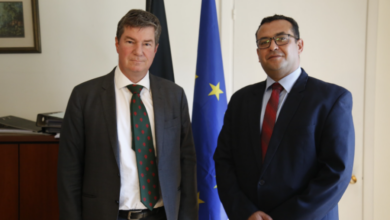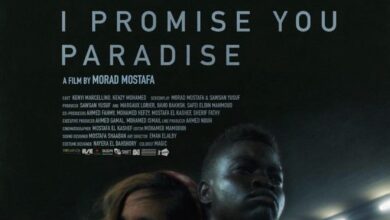On the second day of the Alexandria Film Festival for Mediterranean Countries, the Green Plaza Movie Theater had yet to put up signs indicating the film festival was taking place, and printed schedules were still unavailable. Resources seemed to be directed instead toward a large press conference being held that day at the Hilton Hotel Ballroom for the film “Kamar’s Palm,” which was screened at the festival’s opening ceremony.
It is a shame that the festival organization is so inscrutable because the two competition films screened on Thursday, “Our Grand Despair” from Turkey and “Circus Columbia” from Bosnia, were both excellent.
“Our Grand Despair” is a quiet film about two best friends from childhood, Ender and Cetin, who, now in their late thirties, live together and take care of each other like family. When another close friend, Fikret, is injured in a car accident that also kills his parents, Ender and Cetin take in Fikret’s sister Nihal while he recovers. The young, beautiful, broken girl throws something of a wrench in Ender’s and Cetin’s relationship, both men taking on simultaneously the role of surrogate father and potential lover.
“Our Grand Despair” might contain a few too many long, silent moments of pensive staring. But it is filmed beautifully, the camera often resting on the space between the characters, the food they are sharing, the game they are playing, the books they are reading, creating a visual motif that parallels the depiction of relationships that are very close, somewhat strange, and ultimately grand.
“Circus Columbia,” dealt with heavier subject matter than “Our Grand Despair,” but with a somewhat light and romantic tone. It takes place in a small town in Bosnia in 1991, on the eve of the Bosnian war. Divko, exiled from Yugoslavia in the 1970s, has lived in Germany for the past 20 years. He returns home after the fall of Communism to his former house, bringing along a new, young wife, Azra, and evicting his ex-wife Lucija and son Martin, who stayed behind. Martin becomes closer to Divko and Azra, and family drama plays out alongside rumbles of possible war, which grow louder and more divisive throughout the film.
Though it shows only one small corner of a big story, “Circus Columbia” demonstrates the arbitrary tragedy of former friends and neighbors suddenly dividing over ethnic lines, and depicts a country in the midst of convulsive and unpredictable change through likeable, if not deeply developed characters.
Both films are shot with tender, photographic attention, and tell subtle, human stories from Egypt’s not so distant neighbors, thoroughly interesting and enjoyable to watch.
As competition films continued to show on Friday, including offerings from Spain, Syria, Italy, and Slovenia, the Egyptian short films and documentaries selection was in its second day of screening at the French Cultural Center, featuring animated films and films from the 18 day uprising.
Many of the revolution documentaries, part of a special competition, were repetitive, re-telling the same established narrative and sometimes even using the same footage. Such films continue to have great emotional appeal, watched one after another. But the proliferation of almost identical documentaries begs the question of whether such creation and reinforcement of the finished, victorious narrative of the 18 days is the most productive way for filmmakers to respond to ongoing change in Egypt. Watching such films back to back has the feel of wallowing in successes and happy memories, like watching yourself accept your college graduation diploma over and over again, as though what happened after is of no importance.
There was, of course, some variation. “Newly Born Egypt,” directed by Hesham Abdel Hamid, begins with a step by step retelling of the events of the 18 days that follows the familiar course but ends with rather than cheers of victory, a long segment of interviews with people in and out of Tahrir about their demands for the future, both general and specific. The film resonates more now having recognized that those in Tahrir square and elsewhere in February did not necessarily count their business as finished with the exit of Hosni Mubarak.
Mid-way through its run, the Alexandria Film Festival for Mediterranean countries has brought a wealth of films, long and short, Egyptian and otherwise, to the city. Unfortunately, the festival has been barely publicized, and on Thursday it was still not clear where the rest of the supposed 30 feature films being shown as part of the festival would be screened, beyond the 17 that are screening in the main theater at Green Plaza.
The festival will continue through 9 October, and the shorts and documentaries will continue to be screened until 8 October at the French Cultural Center in Alexandria.
For more detailed information, contact the Alexandria International Film Festival Secretariat, [email protected], +20 22 57 41 112, +20 22 578 0042 .




